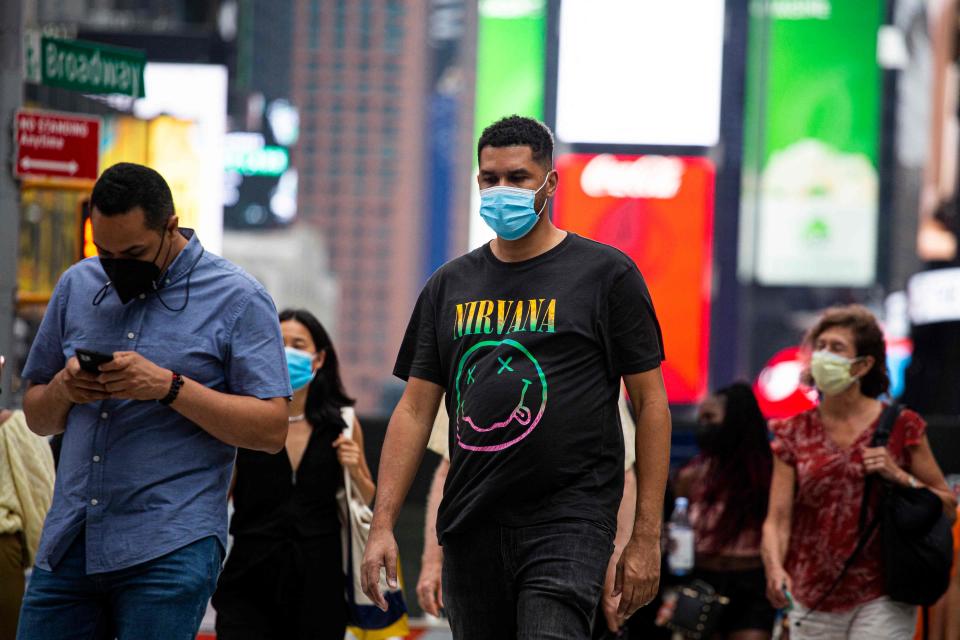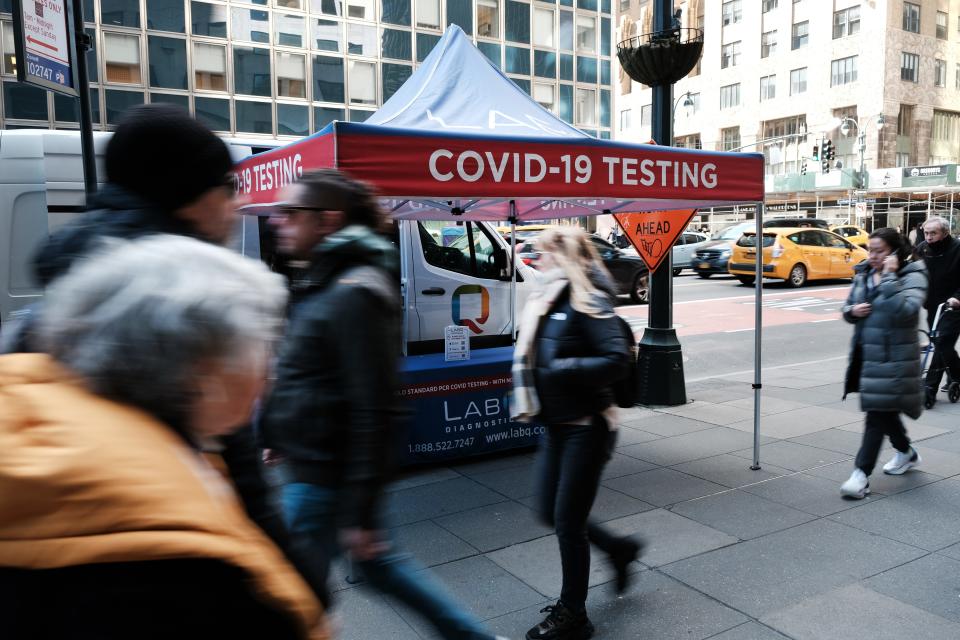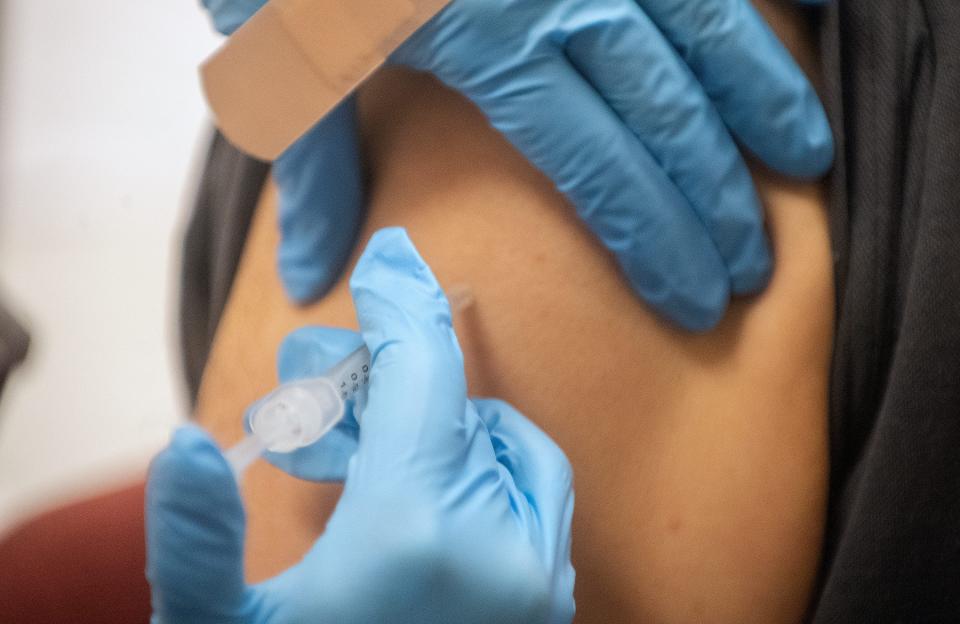COVID-19, RSV, flu or a cold? Figuring out what your symptoms mean this fall and winter
As autumn leaves, cooler weather and pumpkin spice echo amid the fall hustle and bustle, you might notice that you have become victim to that all too familiar tickle in your throat.
The fall and winter are what many experts deem upper respiratory virus season, since so many different illnesses typically spike in cases.
So, you might be wondering what your symptoms indicate. Is it COVID-19? RSV? the flu? Or maybe its a common cold?
"These are all respiratory viruses. Very hard to tell them apart clinically," said Timothy Brewer, a professor of medicine and epidemiology at the University of California Los Angeles. "Clinically they can look identical and we're getting into what's known as respiratory virus season."
Brewer, who both teaches epidemiology and works as infectious disease doctor, says respiratory virus season typically starts in September and lasts until April.
CDC data showed a spike in COVID-19 test positivity rate in August and September, peaking as high as 14.6% on Aug. 26 and declining to 10.9% by Sept. 30. Brewer said he anticipates RSV and flu infection rates to increase in the upcoming months.

FDA signs off on Novavax COVID vaccine: Here's how it's different from other shots
Key differences: COVID-19, flu, RSV and the common cold
It's hard to know which virus you've come down with since many of the symptoms such as fever, runny nose, sore throat, coughing and general fatigue overlap.
But what are the key differences?
It's rare to have difficulty breathing with the cold or flu, but it can often be a symptom of COVID-19. Loss of taste or smell is also sometimes a symptom of COVID-19 but very rarely present with the flu, cold or RSV.
Other symptoms of influenza include: Runny or stuffy nose.
Other symptoms of COVID-19 include: Runny nose.
Other symptoms of RSV include: Decrease in appetite, wheezing.
Does cold weather make you sick?
It's not the cold weather that causes people to get sick, but Brewer says the cold temperatures create an environment that make it easy for all these various viruses to survive and spread.
The viruses that cause the flu, COVID-19, RSV and the common cold all survive better in lower temperatures, Brewer explained. But the "single most important reason" many of us come down with these illnesses during the winter months − "we just spend more time indoors," Brewer explained.
These viruses tend to spread even before people show symptoms, and with many people in close proximity in cold, dry areas, it's easy for them to jump from one person to the next.
Do I need to get tested if I think I'm sick?
Since the symptoms of all these viruses are similar, do you really need to know what virus you're dealing with?
Knowing if it's COVID-19, a flu or just cold may not seem necessary for the many people who are healthy enough to recuperate at home, but Brewer said testing can still be useful information.
"It may not be important for you to know, but you might want to let your grandmother know if you were with your grandmother the last few days before you got sick," Brewer said. "It might be useful information for some of your family or other individuals you are around just to let them know."
RSV vaccine: CDC panel recommends new RSV shot for babies and certain toddlers
With many people vaccinated or already having had COVID-19, there's an overall better immunity than in previous years, he said.
"They might still get infected, they might still get sick, but they won't have the hospitalizations and deaths that they would've had if they hadn't been vaccinated, for example," he said.

COVID-19 remains a concern for high-risk groups
While COVID-19 may come and pass for the average healthy person and mostly feel like a flu, for those who are elderly or have underlying health conditions or are immunocompromised, a COVID-19 infection could have significant health consequences.
"We've had 1.1 million deaths from SARS-CoV-2 over the last three years. That's almost 10 times higher during that time period than what you would expect from influenza," Brewer said. "So, where they're alike is that both of these viruses are very well adapted for transmission from person to person, so they're not going to go away, but at least compared to the influenza circulating right now, SARS-CoV-2 still remains a much more serious virus for some."
If you're experiencing shortness of breath, can't breathe, develop confusion or have a underlying lung or heart disease, Brewer advises you to call a medical professional to figure out if you should be seen.
What to know about vaccinations: Can I get COVID booster, flu shot at the same time?
'Be up to date on your vaccinations'
There are several things you can do to stay healthy this season. The good news, Brewer said, is that many of the measures you take to keep yourself safe from one virus, also apply to the rest.
Washing your hands, social distancing and wearing masks is not only useful to stop the spread of the SARS-CoV-2 (which causes COVID-19) but also the viruses that cause the flu, cold and RSV.
"The single most important things are stay home when you're sick and be up to date on your vaccinations," Brewer said.

He advises that the time to get a flu shot is now. The CDC recommends everyone 6 months or older get a flu vaccine every year. Brewer added that there are vaccines that don't use egg for those who may be allergic.
The sooner you get it, the better, he said, adding it can take between seven to 14 days for protection to kick in.
"Basically, once you hit October, you should be thinking about getting your vaccine," Brewer said.
Those who are eligible for COVID-19 boosters should also make sure they're up to date on the latest vaccination recommendations. Brewer said there's no problem in getting them both at the same time. In fact, he did just that, taking one jab on the right arm, and the other on the left.
For RSV, the CDC only recommends those 60 or older, pregnant woman in their third trimester and infants get vaccinated against the virus.
"The important thing is just to remember that these viruses will be with us throughout the winter and the number of cases will likely increase as we get into colder weather. So don't be surprised when that happens," Brewer said.
This article originally appeared on USA TODAY: COVID-19, flu, RSV and the cold. What you need to know about symptoms:

